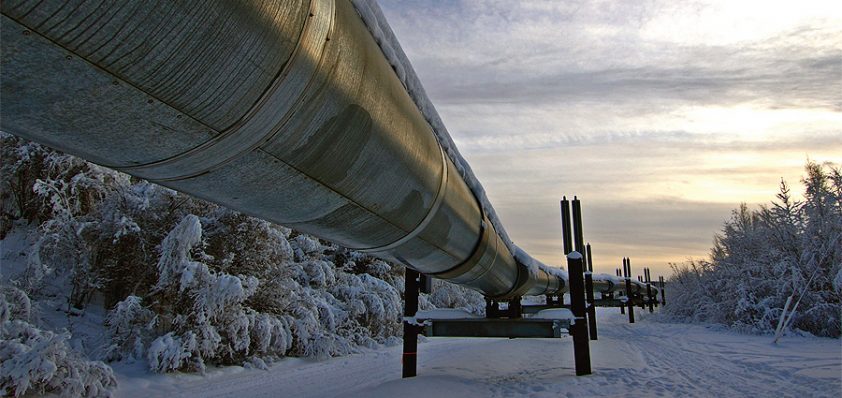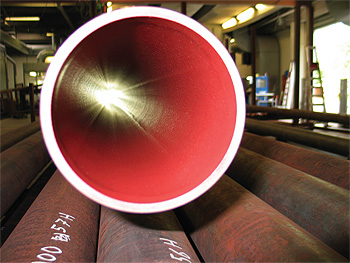
Accoat AS
A fresh coat
Accoat is one of the leading European suppliers of Teflon (PTFE). Working as a contract manufacturer, the company can solve both large and small tasks for the most demanding clientele all across the world.
Accoat offers coatings for all types of pipes, tubings and other steel products – from tiny to very large and long items. Ever since 1969, when it was founded, Accoat has been one of the leaders in the coating business, meaning that it applies high-grade polymer coatings to steel products. Within the oil and gas business, the company carries out the coating of production tubing for downhole production, alongside performing coating services for tanks, vessels, refineries, and chemical plants. Mostly the coatings take the form of corrosion protection, but coatings are also provided for long stay flow enhancement and friction reduction.
The company aims to deliver a consistent level of quality to all its customers, conforming to their expectations, and offering professional and adequate consultancy while remaining a reliable supplier with competitive prices. Niels Uhrbrand, Accoat’s managing director, describes the company’s strengths: “Our main competitive edge over rival fluoropolymer is that we are the only one in the North Sea that has the DuPont StreaMax coating facility. So far this system has not been applicable with fluoropolymer coatings on production tubings, but now it is ready for commercial use. This new coating is also better able to cope with the higher temperatures required to collect oil from some of the more difficult fields currently in operation. The DuPont coating also addresses the  problem of corrosion, which is caused by the chemicals used in these operations.”
problem of corrosion, which is caused by the chemicals used in these operations.”
Delivering its services in-house, the company offers a range of coatings services. Niels explains how the business works: “We are a shop-based company, which means that rather than selling a product, we sell a service that we deliver here at our workshop. If a client has a specific item, such as a tube, pipe or vessel, to be coated, the item will need to be brought to us and we perform the service here. This does mean that we have some limitations in terms of size, because this kind of coating application requires a high temperature – around 400°C. For this reason it’s not an on-site job, but we know that the customer will forgo some convenience for the quality that we can provide in our workshop.”
In December 2009 at the Bright Green exhibition in Copenhagen, Accoat showcased its energy-saving surface solutions, which can cut down a company’s CO2 levels. The issues addressed included energy, transport, environment, and surface solutions, whilst the capture and storage of carbon was the most pressing issue. Accoat participates in the EU’s seventh frame programme (FP7) as part of an intra-European plan to develop high-tech carbon capture and storage (CCS) solutions. The idea is to collect CO2 from the areas where it is generated, and transport it to redundant oilfields deep underground. This means that CO2 emissions can be reduced by storing the gas instead of releasing it into the atmosphere. Accoat’s role in the project is one of significant responsibility given the fact that internal pipe surface treatments are crucial to protecting pipelines from CO2 corrosion and therefore provide secure CO2 transport to the benefit of all Europeans. Niels comments: “At Accoat, we want to do our best to help the world reduce resource consumption and one way of doing that is to raise awareness in the industry about the coating solutions that are currently available and which alongside their environmental credentials also make good business sense.”
He goes on to describe new operations taking place in the North Sea: “The downhole production tubing is brand new for us and for the oil and gas business. Until now it’s only been used in some experimental locations, in particular wells. This is what I want to highlight – we are the company that can provide these new pioneering techniques. These will be the most important projects over the next two or three years.”
Looking ahead Niels describes how he sees the industry conditions developing and his future plans for Accoat as a business: “We see lots of potential to grow. If the current work taking place in the North Sea turns out to be a success, then we intend to go global. We are steadily improving, installing new equipment, and expanding our technology through new investments, so that we can expand the business. In the future we see ourselves becoming the main coating company in the North Sea, and we also see ourselves as a global player in production in the most interesting areas, such as South America, Brazil, and we’re also looking at possibilities in the Middle East. This will be difficult, because we’re not used to these areas, but we thrive on taking on new challenges. We’re also looking at the Indonesian areas so that’s what we expect to work on for the coming years.”
Accoat AS
Products: Fluoropolymer coatings for steel products